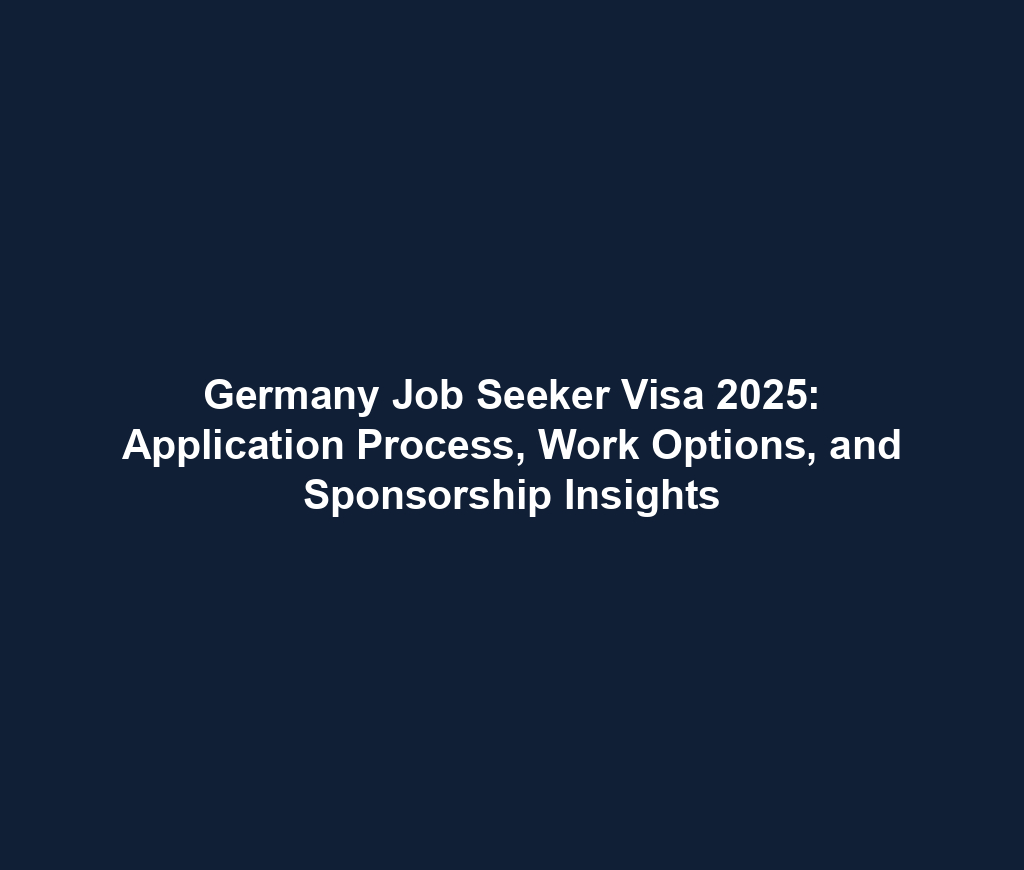In 2025, the Germany Job Seeker Visa stands out as a high-demand immigration pathway for skilled foreign professionals looking to tap into one of Europe’s most robust and high-paying job markets. With a labor shortage exceeding 400,000 vacancies in critical industries like information technology, engineering, finance, healthcare, and skilled trades, Germany is actively encouraging global talent to apply and relocate.
This visa allows non-EU citizens to legally enter Germany and search for full-time employment on-site, without needing a prior job offer. If you’re seeking international job relocation, tax-free salaries, and a structured path to permanent residency, the Job Seeker Visa offers an unmatched opportunity in 2025.
With streamlined visa requirements, faster processing times, and a growing list of in-demand roles, now is the perfect time to leverage this accessible and rewarding migration route.
This comprehensive guide breaks down the eligibility criteria, application process, costs, high-demand job sectors, and strategic tips to help you secure a high-paying job in Germany and build a long-term future in one of the world’s most stable economies.
Why Choose Germany for Your Career in 2025?
Germany stands out as a global hub for innovation, engineering, IT, healthcare, and finance. With one of the lowest unemployment rates in Europe and a high demand for international talent, it’s no surprise that thousands apply for relocation each year. The Germany Job Seeker Visa 2025 is designed to attract skilled professionals to meet the labor market demand and ease the path toward visa sponsorship, permanent residency, and ultimately, citizenship.
Here’s why professionals from countries like Nigeria, India, the Philippines, Pakistan, and Brazil are choosing Germany:
-
Access to world-class healthcare and education systems
-
Lucrative salary packages in tech, healthcare, and engineering
-
Clear pathways to permanent residence (PR) and family reunification
-
Affordable cost of living compared to other European nations
-
Opportunity to explore visa sponsorship jobs with top German employers
What Is the Germany Job Seeker Visa?
The Job Seeker Visa is a long-term residence permit that allows skilled professionals to stay in Germany for up to six months while looking for employment. It does not require a job offer prior to application, making it ideal for people planning to relocate and explore opportunities on-ground.
Unlike tourist or business visas, the Job Seeker Visa gives you the legal right to attend interviews, network with employers, and explore visa-sponsored employment contracts. If you secure a job during your stay, you can transition to a work visa or EU Blue Card without leaving the country.
Eligibility Criteria for Germany Job Seeker Visa 2025
To qualify for the Germany Job Seeker Visa 2025, applicants must meet specific requirements set by the German Federal Government. These include:
-
A recognized university degree or a foreign degree equivalent to a German qualification
-
At least 5 years of relevant professional experience
-
Proof of sufficient financial means to cover your stay (minimum €947 per month or €5,682 for 6 months)
-
Valid passport and travel insurance covering your stay in Germany
-
Strong motivation letter explaining your career plans and job search strategy
-
Proof of accommodation for your intended stay in Germany
Optional but Beneficial:
-
German language skills (B1 or higher) can significantly improve your job prospects
-
Evidence of communication with German employers or job interview invitations
Step-by-Step Application Process
The application process for the Germany Job Seeker Visa 2025 involves detailed documentation and careful preparation. Here’s a breakdown:
Step 1: Credential Evaluation
-
Get your foreign qualifications assessed by Anabin Database or through the ZAB (Central Office for Foreign Education) to ensure your degree is recognized in Germany.
Step 2: Prepare Documents
You’ll need the following:
-
Completed visa application form
-
Valid passport
-
Passport-sized photographs (biometric format)
-
Academic qualification certificates
-
Work experience letters
-
Proof of funds (bank statement or blocked account)
-
Travel insurance (minimum €30,000 coverage)
-
Motivation letter
-
Updated CV in German/Europass format
Step 3: Book Appointment
Book a visa appointment at the German Embassy or Consulate in your country. In some cases, VFS Global handles the document submission.
Step 4: Attend Visa Interview
Be prepared to answer questions about your job search plans, previous experience, and why you’re choosing Germany.
Step 5: Await Approval
Processing time ranges from 4 to 12 weeks depending on the country. Once approved, you’ll receive a visa valid for six months.
What Happens After You Arrive?
Once you land in Germany, it’s time to actively search for a job. During this period, you’re allowed to attend interviews, work-related events, and connect with potential employers. However, you cannot take up employment until a proper work permit or Blue Card is issued.
Make sure to:
-
Register your address at the local Bürgeramt within 14 days
-
Open a local bank account and get a German SIM card
-
Subscribe to job portals and recruitment platforms (see trusted external link below)
Pro Tip: Carry multiple hard copies of your CV and cover letter tailored for each job application. Employers in Germany value attention to detail and local formatting standards.
Popular Job Fields for Visa Sponsorship in Germany
If you’re wondering what jobs qualify for visa sponsorship in Germany, here are high-demand sectors for 2025:
-
IT & Software Development – Python, Java, SAP, Cloud, Cybersecurity
-
Engineering – Mechanical, Civil, Electrical, Automotive
-
Healthcare – Nurses, Doctors, Lab Technicians, Elderly Care
-
Finance & Accounting – Auditors, Tax Consultants, Financial Analysts
-
Skilled Trades – Electricians, Plumbers, Welders, Technicians
-
Education & Research – Teachers, Researchers, Academic Admins
Employers are actively offering relocation assistance and visa sponsorship, especially in tech and medical industries. Many jobs are listed with “Relocation possible” or “Visa Support offered” in job boards like Make It in Germany, the official government portal for international skilled workers.
Pathway to Permanent Residence (PR)
One of the major advantages of the Germany Job Seeker Visa is the clear path to PR. Once you secure a job and convert your visa to a residence permit:
-
After 33 months of working in Germany (with a Blue Card), you can apply for permanent residence
-
If you meet German language proficiency (B1), this period can be reduced to 21 months
-
Family members can join you through a family reunification visa
-
After a few more years, you become eligible for German citizenship
Germany’s Integration Courses, tax incentives, and immigrant-friendly policies make long-term settlement both achievable and rewarding.
Top Job Search Platforms for Germany Job Seeker Visa Holders
Once you arrive in Germany on a Job Seeker Visa, your success largely depends on how well you network and apply for visa-sponsored jobs through the right platforms. Below are the most trusted and effective job portals for international applicants:
-
Make It in Germany – Official government platform offering visa-sponsored job listings, employer profiles, and guidance on integration.
-
LinkedIn Germany – Many German companies post real-time job openings here, often with relocation and visa sponsorship tags.
-
StepStone.de – One of Germany’s largest employment portals with English-language listings.
-
Indeed Germany (indeed.de) – Use filters like “Visa sponsorship” or “Relocation assistance” to target companies open to hiring internationals.
-
Xing.com – The German equivalent of LinkedIn; excellent for local networking and employer connections.
Be sure to create accounts, optimize your profiles, and set alerts for keywords such as:
-
“Visa Sponsorship Jobs in Germany”
-
“Relocation Support”
-
“English-speaking jobs in Germany”
-
“Blue Card eligible positions”
How to Craft a German-Ready CV and Cover Letter
German employers have specific expectations when it comes to job applications. Here’s how to tailor your CV and cover letter to meet those standards:
German CV Tips:
-
Use the Europass format or local German template
-
Include a professional passport-sized photo in the top right corner
-
Add personal details: full name, date of birth, nationality, and contact information
-
Clearly structure work experience, education, skills, and languages
-
List achievements with metrics where possible (e.g., “increased software efficiency by 25%”)
-
Keep it 2 pages maximum
Cover Letter Tips:
-
Personalize the letter with the hiring manager’s name
-
Begin with your reason for interest in the company
-
Highlight key achievements relevant to the job
-
Mention your Job Seeker Visa status and willingness to relocate
-
Close with a strong call to action, such as requesting an interview
A well-written CV and cover letter tailored to German standards can dramatically increase your chances of landing interviews and eventually securing visa sponsorship employment.
Relocation Support and Integration Services in Germany
After you secure a job offer, many companies in Germany provide relocation assistance to help ease your move. This support may include:
-
Temporary housing or accommodation allowance
-
Reimbursement for flights or travel expenses
-
German language training or cultural orientation
-
Legal aid for visa conversion or Blue Card processing
-
Help registering with local tax, health, and city authorities
You can also access integration courses (Integrationskurse) offered by the German Federal Office for Migration and Refugees (BAMF), which combine language training and cultural education, essential for those planning long-term settlement.
These resources are especially useful if you’re considering permanent residence or citizenship later on.
Alternatives to the Germany Job Seeker Visa
If you don’t meet the criteria for the Job Seeker Visa or prefer other routes, Germany offers several alternative pathways:
-
EU Blue Card: For highly qualified professionals with a concrete job offer and a salary above €45,300 (as of 2025).
-
Skilled Worker Visa: For professionals with vocational training and job offers in shortage occupations.
-
Freelance Visa: Ideal for artists, IT experts, consultants, and other self-employed workers.
-
Student Visa: If you wish to study in Germany first and then transition to work.
-
Job Search After Study: Graduates of German universities get 18 months to find a job relevant to their field.
Each route offers distinct advantages and timelines toward permanent residency. If you’re unsure which is best for your profile, consider professional immigration consultation services.
Final Thoughts: Secure High-Paying Jobs in Germany with the 2025 Job Seeker Visa
The Germany Job Seeker Visa 2025 is more than just a travel document, it’s your strategic entry point into one of the highest-paying job markets in Europe. With no need for a prior job offer, this visa empowers skilled professionals from non-EU countries to directly access Germany’s booming industries, including IT, engineering, finance, healthcare, logistics, and construction.
Backed by Germany’s progressive immigration reforms, employer-sponsored job opportunities, and a labor shortage surpassing 400,000 open positions, now is the time to act.
By arriving prepared, with a professional German-style CV, a clear job search strategy, proof of sufficient funds, and a commitment to learning basic German, you significantly boost your chances of landing a visa-sponsored role with a salary range of €43,000 to €100,000 annually.
If you’re looking for long-term residency, family relocation, or a career upgrade in Europe, this is your moment. Don’t wait for the market to tighten—start your application, explore Make It In Germany and EURES, and unlock your professional future in Germany today.
Let’s get started—Germany is hiring, and your skills are in demand.
FAQs
Can I extend the Job Seeker Visa if I don’t find a job in 6 months?
No, the visa is not extendable. However, you can leave and reapply later, or apply for another type of German visa.
How long can it take to get a residence permit after getting a job?
Once you sign your job contract, it typically takes 2 to 6 weeks to process your residence or EU Blue Card permit, depending on your local Ausländerbehörde (foreigners’ office).
Will I get support from German companies during job search?
While companies generally do not sponsor Job Seeker Visa applicants, many offer relocation support once a job is secured.
Can I apply for PR directly after job seeker visa?
No. You must first secure employment, convert to a work or Blue Card visa, and then accumulate the required years of work and residence before applying for PR.
Does Germany accept all foreign degrees?
Only recognized and accredited degrees are accepted. Always check your degree’s status via the Anabin Database before applying.



